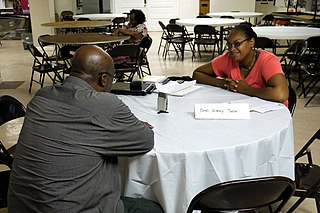
Oral history is the collection and study of historical information about people, families, important events, or everyday life using audiotapes, videotapes, or transcriptions of planned interviews. These interviews are conducted with people who participated in or observed past events and whose memories and perceptions of these are to be preserved as an aural record for future generations. Oral history strives to obtain information from different perspectives and most of these cannot be found in written sources. Oral history also refers to information gathered in this manner and to a written work based on such data, often preserved in archives and large libraries. Knowledge presented by Oral History (OH) is unique in that it shares the tacit perspective, thoughts, opinions and understanding of the interviewee in its primary form.
The Highlander Research and Education Center, formerly known as the Highlander Folk School, is a social justice leadership training school and cultural center in New Market, Tennessee. Founded in 1932 by activist Myles Horton, educator Don West, and Methodist minister James A. Dombrowski, it was originally located in the community of Summerfield in Grundy County, Tennessee, between Monteagle and Tracy City. It was featured in the 1985 documentary film, You Got to Move. Much of the history was documented in the book Or We'll All Hang Separately: The Highlander Idea by Thomas Bledsoe.
Timothy B. Tyson is an American writer and historian who specializes in the issues of culture, religion, and race associated with the Civil Rights Movement. He is a senior research scholar at the Center for Documentary Studies at Duke University and an adjunct professor of American Studies at the University of North Carolina.
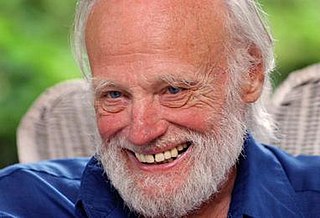
John Marsden Ehle, Jr. was an American writer known best for his fiction set in the Appalachian Mountains of the American South. He has been described as "the father of Appalachian literature".
Howard Washington Odum was an American sociologist and author who researched African-American life and folklore. Beginning in 1920, he served as a faculty member at the University of North Carolina, founding the university press, the journal Social Forces, and what is now the Howard W. Odum Institute for Research in Social Science, all in the 1920s. He also founded the university's School of Public Welfare, one of the first in the Southeast. With doctorates in psychology and sociology, he wrote extensively across academic disciplines, influencing several fields and publishing three novels in addition to 20 scholarly texts. He was white.
George Hyndman Esser Jr. was an American civil rights advocate who led the North Carolina Fund at the request of then-governor Terry Sanford in the 1960s.

Floyd Bixler McKissick was an American lawyer and civil rights activist. He became the first African-American student at the University of North Carolina School of Law. In 1966 he became leader of CORE, the Congress of Racial Equality, taking over from James Farmer. A supporter of Black Power, he turned CORE into a more radical movement. In 1968, McKissick left CORE to found Soul City in Warren County, North Carolina. He was an active Republican and endorsed Richard Nixon for president that year, and the federal government, under President Nixon, supported Soul City. He became a state district court judge in 1990 and died on April 28, 1991. He was a member of Alpha Phi Alpha fraternity.
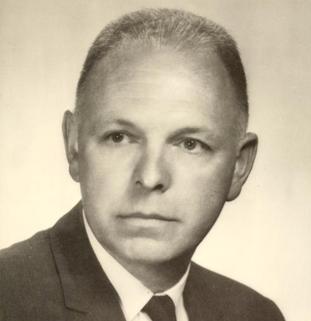
Joseph Carlyle "Lyle" Sitterson was an American educator who served as chancellor of the University of North Carolina at Chapel Hill from February 16, 1966, to January 31, 1972.

The Center for the Study of the American South (CSAS) is an academic organization dedicated to the study of "southern history, literature, and culture as well as ongoing social, political, and economic issues" at the University of North Carolina at Chapel Hill.

The Southern Historical Collection is a repository of distinct archival collections at the University of North Carolina at Chapel Hill which document the culture and history of the American South. These collections are made up of unique primary materials, such as manuscripts, letters, photographs, diaries, drawings, scrapbooks, journals, oral histories, maps, ledgers, moving images, literary manuscripts, albums, and other materials.
Olive "Polly" Matthews Stone was a sociologist whose interests focused on human welfare, race relations, and southern American farmers. Throughout her life, she was actively involved in several Marxist reading groups and financially contributed to union organizing in the black belt region.
Jacquelyn Dowd Hall is an American historian and Julia Cherry Spruill Professor Emerita at the University of North Carolina at Chapel Hill. Her scholarship and teaching forwarded the emergence of U.S. women's history in the 1960s and 1970s, helped to inspire new research on Southern labor history and the long civil rights movement, and encouraged the use of oral history sources in historical research. She is the author of Revolt Against Chivalry: Jessie Daniel Ames and the Women’s Campaign Against Lynching;Like a Family: The Making of a Southern Cotton Mill World and Sisters and Rebels: The Struggle for the Soul of America.
Arthur Franklin Raper was an American sociologist. He is best known for his research on lynching, sharecropping, and rural development.
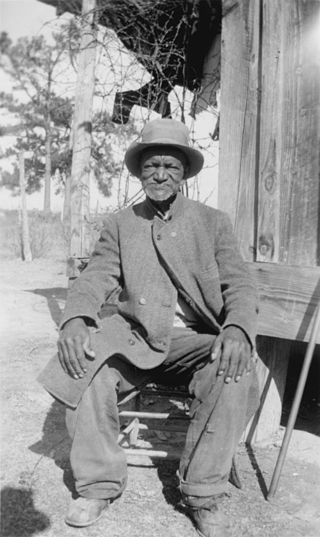
Slave Narratives: A Folk History of Slavery in the United States is a collection of histories by formerly enslaved people undertaken by the Federal Writers' Project of the Works Progress Administration from 1936 to 1938. It was the simultaneous effort of state-level branches of FWP in seventeen states, working largely separately from each other. FWP administrators sought to develop a new appreciation for the elements of American life from different backgrounds, including that from the last generation of formerly enslaved individuals. The collections of life histories and materials on African American life that resulted gave impetus to the collection.

The Samuel Proctor Oral History Program (SPOHP) is the official oral history program at the University of Florida. With over 6,500 interviews and more than 150,000 pages of transcribed material, it is one of the premier oral history programs in the United States. SPOHP's mission is "to gather, preserve, and promote living histories of individuals from all walks of life." The program involves staff, undergraduate and graduate students, and community volunteers in its operation.
Hocutt v. Wilson, N.C. Super. Ct. (1933) (unreported), was the first attempt to desegregate higher education in the United States. It was initiated by two African American lawyers from Durham, North Carolina, Conrad O. Pearson and Cecil McCoy, with the support of the National Association for the Advancement of Colored People (NAACP). The case was ultimately dismissed for lack of standing, but it served as a test case for challenging the "separate but equal" doctrine in education and was a precursor to Brown v. Board of Education, 347 U.S. 483 (1954).
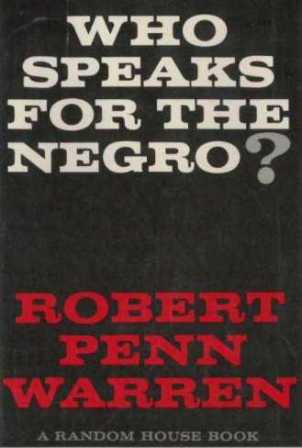
Who Speaks for the Negro? is a 1965 book of interviews by Robert Penn Warren conducted with Civil Rights Movement activists. The book was reissued by Yale University Press in 2014. The Robert Penn Warren Center for the Humanities at Vanderbilt University created the Who Speaks for the Negro? digital archive featuring digitized versions of the original reel-to-reel recordings that Warren compiled for each of his interviewees as well as print materials related to the project, including the transcripts of those recordings, letters written between Warren and the interviewees, and contemporary reviews of the book.
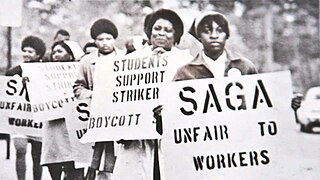
The UNC Food Workers Strike was a labor strike at the University of North Carolina at Chapel Hill that began on February 23 and lasted until December 9, 1969. Through the leadership of Mary Smith and Elizabeth Brooks and with the support of student groups and civil rights activists, the strike was organized around a list of demands to improve the working conditions of black food workers. The protesting employees of Lenoir Hall presented this list to University Chancellor J. Carlyle Sitterson, who responded by asserting his commitment "to be[ing] responsive to the educational needs of. .. all races, colors, and creeds" but also his inability to treat any group with preference and to make significant changes on their behalf. He directed a police response to campus disruptions with North Carolina Governor Robert W. Scott, further instigating the protesters and drawing widespread attention to the issue. The subsequent formation of the UNC Non-Academic Employees Union prompted Governor Scott to negotiate with and ultimately accept the terms of the protesters on March 21, 1969. UNC facility employees experienced an increase in wage and working conditions, and this lasted until food management transferred from internal to contractual service provided by SAGA Food Service less than a month later. The change in employers sparked workers, many of whom participated in the first strike, to voice their discontent once again. Employees and students responded immediately, with the strike resuming, among other forms of protest, until its conclusion on December 9, 1969, when black supporters threatened to descend on the campus to elevate the issue if union negotiations did not begin.

Oral History of American Music (OHAM), founded in 1969, is an oral history project and archive of audio and video recordings consisting mainly of interviews with American classical and jazz musicians. It is a special collection of the Irving S. Gilmore Music Library at Yale University and housed within the Sterling Memorial Library building in New Haven, Connecticut. It currently holds approximately 3,000 interviews with more than 900 subjects and is considered the definitive collection of its kind.

Watts Restaurant and Grill was a former restaurant operating in Chapel Hill, Orange County, North Carolina throughout the 1950s and 60s.












